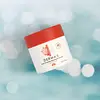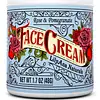What's inside
What's inside
 Key Ingredients
Key Ingredients

 Benefits
Benefits

 Concerns
Concerns

 Ingredients Side-by-side
Ingredients Side-by-side

Water
Skin ConditioningCarthamus Tinctorius Seed Oil
MaskingStearic Acid
CleansingGlycerin
HumectantGlyceryl Stearate Se
EmulsifyingCetyl Alcohol
EmollientMicrocrystalline Cellulose
AbsorbentCellulose Gum
Emulsion StabilisingPersea Gratissima Oil
Skin ConditioningSesamum Indicum Seed Oil
EmollientHelianthus Annuus Seed Oil
EmollientBakuchiol
AntimicrobialRetinol
Skin ConditioningPanthenol
Skin ConditioningTocopheryl Acetate
AntioxidantAllantoin
Skin ConditioningPhenoxyethanol
PreservativeEthylhexylglycerin
Skin ConditioningParfum
MaskingWater, Carthamus Tinctorius Seed Oil, Stearic Acid, Glycerin, Glyceryl Stearate Se, Cetyl Alcohol, Microcrystalline Cellulose, Cellulose Gum, Persea Gratissima Oil, Sesamum Indicum Seed Oil, Helianthus Annuus Seed Oil, Bakuchiol, Retinol, Panthenol, Tocopheryl Acetate, Allantoin, Phenoxyethanol, Ethylhexylglycerin, Parfum
Petroleum Distillates
SolventAloe Barbadensis Leaf Juice
Skin ConditioningGlycerin
HumectantPersea Gratissima Oil
Skin ConditioningEmulsifying Wax Nf
Limnanthes Alba Seed Oil
Skin ConditioningPunica Granatum Fruit Extract
AntioxidantCitrus Aurantium Dulcis Fruit Extract
MaskingCitrus Limon Fruit Extract
MaskingVaccinium Macrocarpon Fruit Extract
AstringentTocopherol
AntioxidantCalcium Ascorbate
AntioxidantEthylhexylglycerin
Skin ConditioningPhenoxyethanol
PreservativeUbiquinone
AntioxidantRetinol
Skin ConditioningThioctic Acid
AntioxidantPanthenol
Skin ConditioningPantothenic Acid
Skin ConditioningNiacinamide
SmoothingCanola Oil
EmollientLecithin
EmollientCitric Acid
BufferingPetroleum Distillates, Aloe Barbadensis Leaf Juice, Glycerin, Persea Gratissima Oil, Emulsifying Wax Nf, Limnanthes Alba Seed Oil, Punica Granatum Fruit Extract, Citrus Aurantium Dulcis Fruit Extract, Citrus Limon Fruit Extract, Vaccinium Macrocarpon Fruit Extract, Tocopherol, Calcium Ascorbate, Ethylhexylglycerin, Phenoxyethanol, Ubiquinone, Retinol, Thioctic Acid, Panthenol, Pantothenic Acid, Niacinamide, Canola Oil, Lecithin, Citric Acid
 Reviews
Reviews

Ingredients Explained
These ingredients are found in both products.
Ingredients higher up in an ingredient list are typically present in a larger amount.
Ethylhexylglycerin (we can't pronounce this either) is commonly used as a preservative and skin softener. It is derived from glyceryl.
You might see Ethylhexylglycerin often paired with other preservatives such as phenoxyethanol. Ethylhexylglycerin has been found to increase the effectiveness of these other preservatives.
Glycerin is already naturally found in your skin. It helps moisturize and protect your skin.
A study from 2016 found glycerin to be more effective as a humectant than AHAs and hyaluronic acid.
As a humectant, it helps the skin stay hydrated by pulling moisture to your skin. The low molecular weight of glycerin allows it to pull moisture into the deeper layers of your skin.
Hydrated skin improves your skin barrier; Your skin barrier helps protect against irritants and bacteria.
Glycerin has also been found to have antimicrobial and antiviral properties. Due to these properties, glycerin is often used in wound and burn treatments.
In cosmetics, glycerin is usually derived from plants such as soybean or palm. However, it can also be sourced from animals, such as tallow or animal fat.
This ingredient is organic, colorless, odorless, and non-toxic.
Glycerin is the name for this ingredient in American English. British English uses Glycerol/Glycerine.
Learn more about GlycerinPanthenol is a common ingredient that helps hydrate and soothe the skin. It is found naturally in our skin and hair.
There are two forms of panthenol: D and L.
D-panthenol is also known as dexpanthenol. Most cosmetics use dexpanthenol or a mixture of D and L-panthenol.
Panthenol is famous due to its ability to go deeper into the skin's layers. Using this ingredient has numerous pros (and no cons):
Like hyaluronic acid, panthenol is a humectant. Humectants are able to bind and hold large amounts of water to keep skin hydrated.
This ingredient works well for wound healing. It works by increasing tissue in the wound and helps close open wounds.
Once oxidized, panthenol converts to pantothenic acid. Panthothenic acid is found in all living cells.
This ingredient is also referred to as pro-vitamin B5.
Learn more about PanthenolPersea Gratissima Oil is also known as avocado oil.
Avocado Oil has antioxidant properties. It is mostly made up of the glycerides of fatty acids. About 67% of these fatty acids is made up of oleic acid. Palmitic acid and linoleic acid are also present.
These fatty acids help hydrate and soften the skin. It may increase collagen content in the skin. Collagen helps keep your skin plump and firm. This ingredient helps reduce inflammation and has not shown to clog pores.
This ingredient may not be fungal-acne safe due to its high fatty acid content.
Avocados also have B vitamins, vitamin K, vitamin C, vitamin E, and potassium.
Learn more about Persea Gratissima OilPhenoxyethanol is a preservative that has germicide, antimicrobial, and aromatic properties. Studies show that phenoxyethanol can prevent microbial growth. By itself, it has a scent that is similar to that of a rose.
It's often used in formulations along with Caprylyl Glycol to preserve the shelf life of products.
Retinol is a gold-standard ingredient for anti-aging. It is a form of Vitamin A and belongs to the class of retinoids that also includes tretinoin.
Why is retinol famous?
It has the most scientific studies backing up its skin benefits out of all the non-prescription ingredients.
Retinol is proven to:
This is why retinol is effective at removing wrinkles, fading dark spots, treating acne, and reducing the appearance of pores.
Studies show retinol is less effective when exposed to UV. Be sure to look for appropriate packaging to keep your retinol potent (similar to Vitamin C).
Using retinol or any retinoids will increase sun-sensitivity in the first few months. Though studies show retinoids increase your skin's natural SPF with continuous use, it is best to always wear sunscreen and sun-protection.
We recommend speaking with a medical professional about using this ingredient during pregnancy.
Retinol may cause irritation in some people, so be sure to patch test. Experts recommend 'ramping up' retinol use: start using this ingredient once a week and work up to using it daily.
Read about Tretinoin
Learn more about Retinol